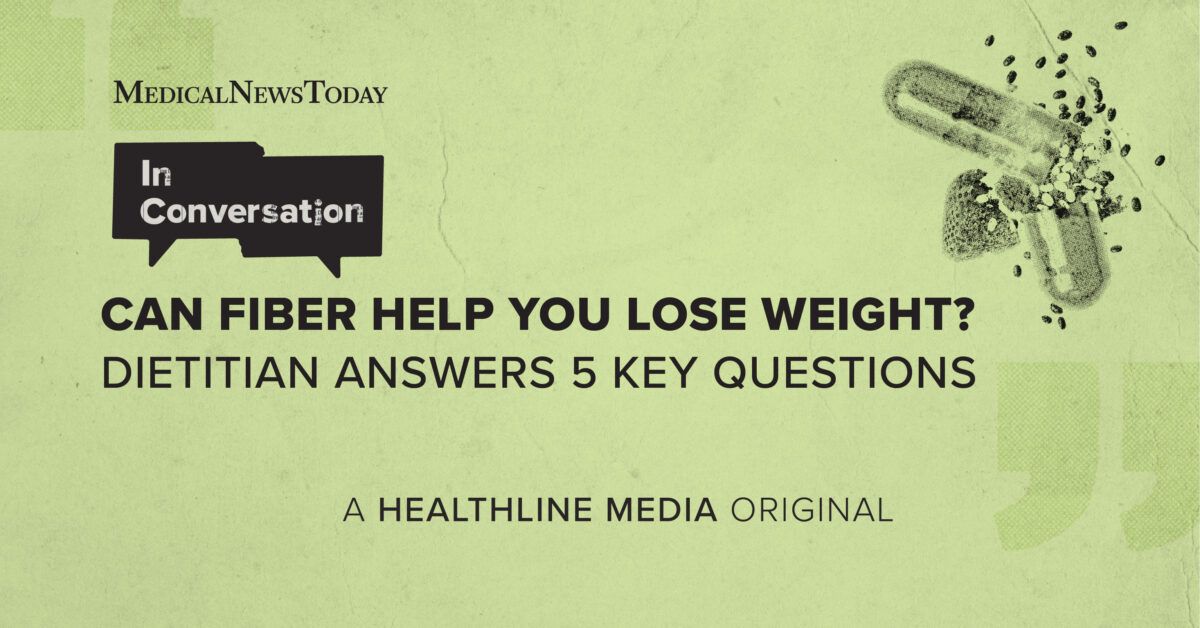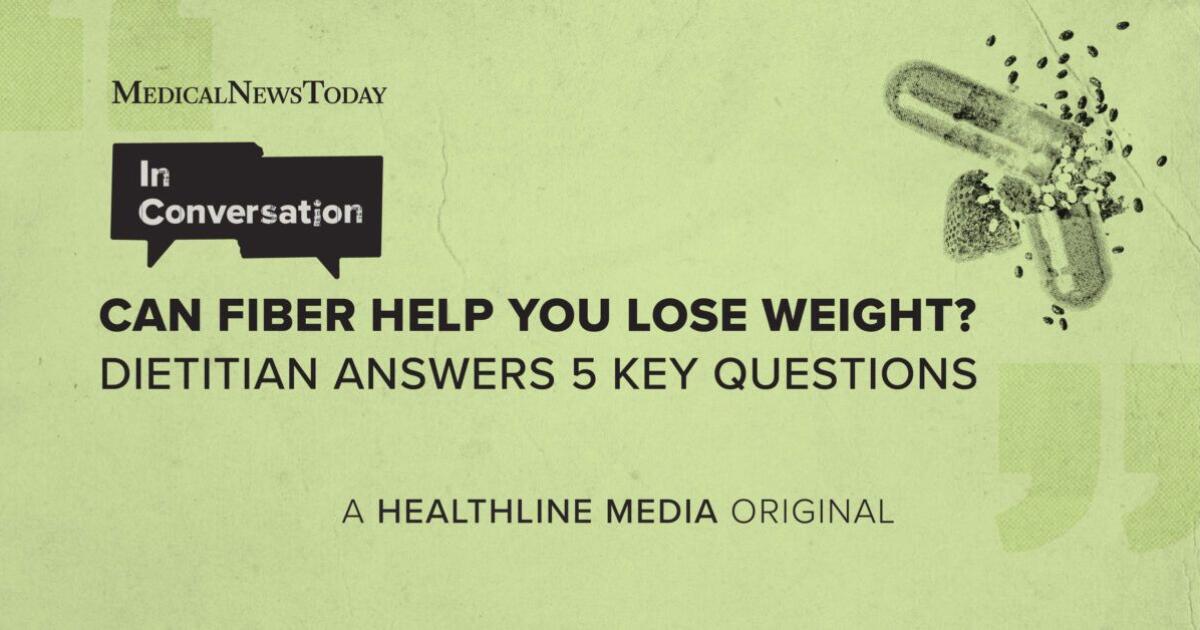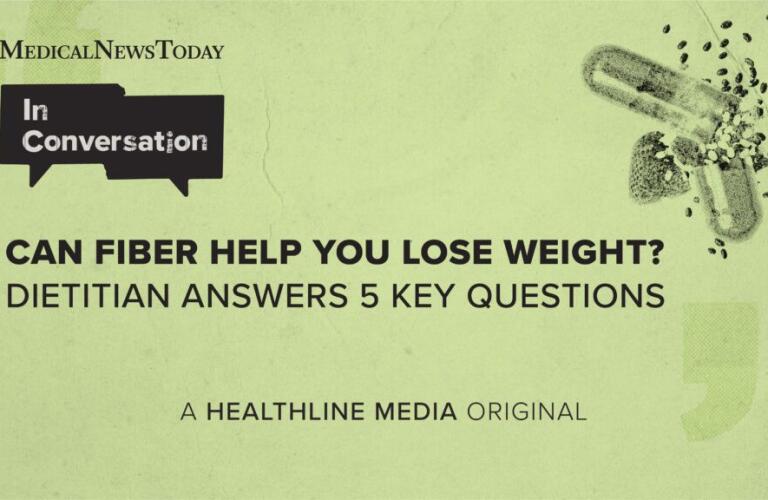Can Fiber Help You Lose Weight? Dietitian Reveals All
Ever wonder if there's a secret ingredient to help you shed those extra pounds? What if that secret is already on your plate?
Fiber is the unsung hero of the dietary world, often overlooked despite its powerful benefits. Imagine being able to feel full, satisfied, and lose weight—all by making one small tweak to your diet. Sounds too good to be true, right?
But it's not. You might be asking yourself: can fiber really help you lose weight? And if so, how does it work? A dietitian will answer five key questions that could transform the way you think about food and weight loss. If you’re ready to unlock a simple yet effective strategy for weight loss, keep reading. The answers might just surprise you and change your eating habits for good.

Credit: www.medicalnewstoday.com
Benefits Of Fiber For Weight Loss
Incorporating fiber into your diet can be a smart strategy for weight loss. Fiber offers multiple benefits that not only aid in shedding pounds but also promote overall health. Understanding how fiber works can help you make better dietary choices.
Feeling Fuller Longer
Fiber-rich foods help you feel full for extended periods. They slow down digestion, keeping hunger pangs at bay. This means fewer cravings between meals, reducing the temptation to snack. High-fiber foods like whole grains, fruits, and vegetables are great choices.
Reducing Calorie Intake
Fiber can naturally lower your calorie intake. Foods high in fiber tend to be less calorie-dense. Eating more fiber-rich foods means consuming fewer calories without feeling deprived. This calorie reduction can contribute significantly to weight loss.
Types Of Fiber
Different types of fiber, like soluble and insoluble, may aid weight loss by promoting fullness and regulating digestion. Each type offers unique benefits, supporting overall health while helping manage weight effectively.
Understanding the types of fiber is crucial if you're considering fiber as a tool for weight loss. Fiber isn't just one thing; it's a category of different substances that perform unique functions in your body. Knowing how each type works can help you make smarter dietary choices. Let's dive into the two main types: soluble and insoluble fiber.Soluble Fiber
Soluble fiber is a type that dissolves in water, forming a gel-like substance in your gut. This gel slows digestion, helping you feel full longer. Foods like oats, apples, and beans are rich in soluble fiber, making them excellent choices for those looking to manage hunger. Imagine eating a bowl of oatmeal in the morning. That feeling of fullness you experience is the soluble fiber at work. It stabilizes your blood sugar levels, reducing those mid-morning snack cravings. Incorporating soluble fiber into your diet can be as simple as adding a handful of berries to your cereal. How could such a simple change in your breakfast routine impact your weight loss journey?Insoluble Fiber
Insoluble fiber, on the other hand, doesn’t dissolve in water. It adds bulk to your stool and aids in regular bowel movements. Think of foods like whole grains, nuts, and vegetables; these are your go-to options for insoluble fiber. Consider how a regular intake of whole grains can keep your digestive system running smoothly. A healthy digestive system is often a less-talked-about key to weight management. Picture this: a salad made with a variety of colorful veggies not only boosts your fiber intake but also supports your overall gut health. Could improving your digestion be the missing piece in your weight loss plan? By understanding the types of fiber and their roles, you can tailor your diet to better meet your weight loss goals. What small changes could you make today to benefit from the power of fiber?Foods Rich In Fiber
Fiber is an essential part of any diet. It plays a crucial role in weight management. Foods rich in fiber help you feel full longer. This can reduce overall calorie intake. Consuming fiber-rich foods supports digestive health. They also regulate blood sugar levels. Let's explore some foods high in fiber.
Fruits And Vegetables
Fruits and vegetables are excellent sources of fiber. Apples, bananas, and oranges are top choices. Berries like strawberries and raspberries offer high fiber content. Leafy greens, broccoli, and carrots are fiber-rich vegetables. These foods are easy to incorporate into meals. They add flavor and texture to dishes.
Whole Grains
Whole grains provide significant amounts of fiber. Oats, quinoa, and brown rice are popular options. Whole grain bread and pasta are also fiber-rich. Choose these over refined grains for better nutrition. They help maintain energy levels throughout the day. Whole grains support a healthy digestive system.
Legumes And Nuts
Legumes like beans and lentils are packed with fiber. They are versatile and can be added to many recipes. Nuts such as almonds and walnuts are fiber-rich snacks. These foods provide healthy fats and protein. They are satisfying and boost overall health. Including legumes and nuts in meals enhances fiber intake.
Incorporating Fiber Into Your Diet
Fiber aids weight loss by promoting feelings of fullness. It can help control appetite and reduce calorie intake. Dietitians answer common questions to guide you in adding fiber to your meals effectively.
Incorporating more fiber into your diet can be a game-changer for your weight loss journey. Fiber-rich foods not only help you feel full longer but also provide essential nutrients for your body. The challenge is finding creative and practical ways to add fiber to your meals and snacks. Let's dive into some strategies that can make this easier and more enjoyable.Meal Planning Tips
Planning meals with fiber in mind doesn't have to be complicated. Start by choosing whole grains over refined ones. Think brown rice, quinoa, and whole wheat pasta. Add a variety of vegetables to your dishes. Aim for colorful salads or stir-fries. This not only boosts fiber but also adds flavor and texture. Experiment with legumes like beans and lentils. They are fiber powerhouses and can be used in soups, stews, and even salads. Consider making a weekly meal plan and include at least one fiber-rich food in every meal.Snack Ideas
Snacking smartly can help you maintain energy levels and avoid overeating at meal times. Reach for fruits like apples and pears. They are portable and packed with fiber. Nuts and seeds can be your go-to snack. A handful of almonds or sunflower seeds can curb hunger and provide a fiber boost. If you have a sweet tooth, try air-popped popcorn. It's a whole grain snack that's high in fiber. Just be mindful of added butter or sugar. How often do you find yourself reaching for chips or cookies? Consider swapping them for these fiber-rich options and notice the difference it makes in your day. By making small, consistent changes, you can easily increase your fiber intake and support your weight loss goals. What will be your first fiber-rich swap?Common Myths About Fiber
Fiber is often hailed as a miracle worker for weight loss, but there's a cloud of myths surrounding it. You might think fiber is just about digestion, or perhaps you've heard it can hinder nutrient absorption. These misconceptions can confuse your health journey. Let's clear the air and explore what fiber really does.
Fiber And Digestive Health
Many believe that fiber is solely responsible for keeping your digestive system in check. While fiber does play a crucial role, it's not the only player in your gut health. Imagine fiber as the broom that sweeps through your intestines, keeping things moving smoothly.
However, fiber isn’t the sole hero. Hydration, regular exercise, and a balanced diet also contribute to a happy gut. Have you ever noticed how a walk after a meal can help digestion? Your body needs a team effort, not just fiber, to keep everything balanced.
Fiber And Nutrient Absorption
Another common myth is that fiber blocks nutrient absorption. This isn't entirely true. While fiber can slow down the digestion process, it actually helps your body absorb nutrients more effectively.
Think of fiber as a pace setter. It ensures your body gets enough time to process and absorb nutrients. Have you ever felt fuller after a fiber-rich meal? This is because fiber helps regulate hunger and keeps you satisfied longer.
When you eat fiber-rich foods, your body benefits from a steady release of energy. This means fewer cravings and more sustained energy throughout the day. Isn't that what you want from your meals?
Understanding the truth about fiber can transform your approach to weight loss. Could changing your perspective on fiber be the key to unlocking your health goals?
Potential Drawbacks Of Fiber
Eating too much fiber can cause bloating and gas. Not all fiber types aid weight loss. Some people may experience digestive discomfort.
When you think of fiber, you might only see it as a weight-loss ally. But did you know too much fiber can have its downsides? While fiber is essential for a healthy diet, it's important to be aware of some potential drawbacks that might affect your journey to a healthier you.Digestive Discomfort
Eating too much fiber too quickly can lead to uncomfortable digestive issues. You might experience bloating, gas, or even cramps. Imagine eagerly adding a large bowl of beans to your dinner, only to spend the evening feeling bloated. This happens because your digestive system needs time to adjust to high fiber intake. Gradually increasing your fiber can help your body get used to it. Have you noticed any changes when you've suddenly increased fiber in your diet?Balancing Fiber Intake
The key to enjoying fiber's benefits without the drawbacks is balance. How much fiber should you aim for? Most adults need around 25 to 38 grams per day. But remember, balance doesn't mean just hitting a number. It's about spreading your fiber intake throughout the day. Consider having oatmeal in the morning, a salad for lunch, and beans at dinner. This way, your digestive system can process fiber more efficiently. Have you found a balance that works for you? If you're not sure where to start, keep a food diary for a week. Track your fiber intake and note how your body responds. Taking small, manageable steps can make all the difference in your fiber journey.Expert Insights From Dietitians
When trying to lose weight, you might wonder if fiber could be your secret weapon. Dietitians offer valuable insights that could change how you look at your plate. Fiber isn't just about digestion; it plays a crucial role in weight management.
Imagine feeling fuller with less food, helping you cut down on extra calories. Dietitians emphasize how fiber can do just that. They share practical tips that you can easily add into your daily routine.
Recommended Daily Intake
How much fiber should you aim for each day? Dietitians suggest adults consume about 25 to 30 grams of fiber daily. But are you hitting that target?
Consider checking food labels next time you shop. Whole grains, fruits, and vegetables are high in fiber. Could adding these to your meals make a difference?
Personalized Advice
Everyone's body is different, and your fiber needs might vary. Have you spoken to a dietitian about what works best for you?
They can offer personalized advice based on your lifestyle and health goals. Maybe you work long hours and need quick, fiber-rich snacks. Or perhaps you're a stay-at-home parent looking for family-friendly meals.
Wouldn't it be great to have a tailored plan that fits your life? Dietitians can provide that, ensuring you get the most out of your fiber intake.

Credit: resources.healthgrades.com

Credit: resources.healthgrades.com
Frequently Asked Questions
Can Fiber Help You Lose Weight?
Yes, fiber can help with weight loss. It promotes fullness, reduces appetite, and aids in controlling calorie intake. Fiber-rich foods often require more chewing and take longer to digest, which helps in feeling satisfied longer. Incorporating fiber into your diet can support weight management goals effectively.
Do Fiber Rich Diets Contribute To Weight Loss By Causing A Person To Feel Full?
Fiber rich diets aid weight loss by promoting fullness. They slow digestion, reducing hunger and calorie intake. Eating high-fiber foods helps control appetite and supports healthy weight management. Incorporating fruits, vegetables, and whole grains into meals can enhance satiety and contribute to effective weight loss efforts.
Does Fiber Speed Up Metabolism?
Fiber can aid digestion and increase feelings of fullness. It indirectly supports metabolism by improving gut health. Eating fiber-rich foods can help manage weight, which may positively influence metabolic rate. Incorporating more fiber into your diet can be beneficial for overall metabolic function.
Which Fibre Food Is Best For Weight Loss?
Oats, chia seeds, and lentils are top fiber foods for weight loss. They boost digestion and keep you full longer. Eating them can help curb cravings and support a healthy diet. Include a variety of fruits and vegetables for added fiber benefits.
Conclusion
Fiber can play a key role in weight loss. It helps you feel full longer. This can lead to eating less. Including fiber-rich foods is a smart choice. Fruits, vegetables, and whole grains are great options. Balance is important in your diet.
Consult a dietitian for personalized advice. Small changes can make a big difference. Start adding more fiber today. Your body will thank you. Keep track of your progress. Remember, healthy eating supports a healthy life.

.png)
.png)